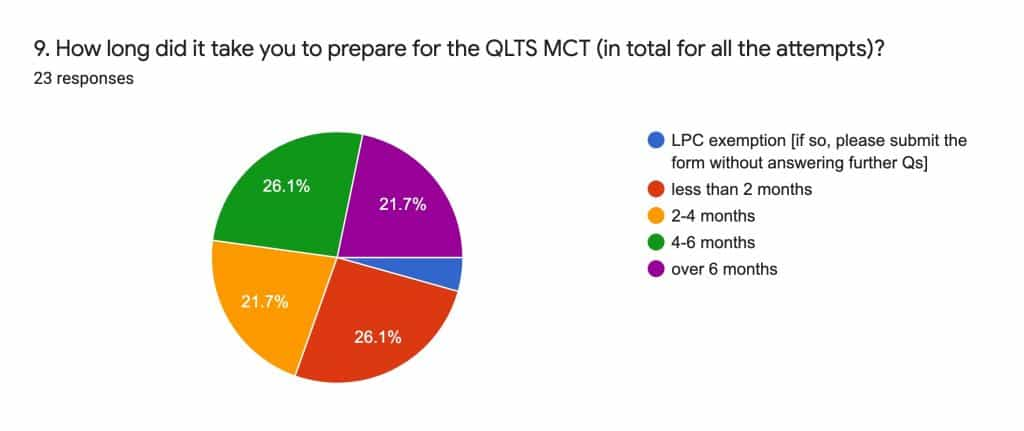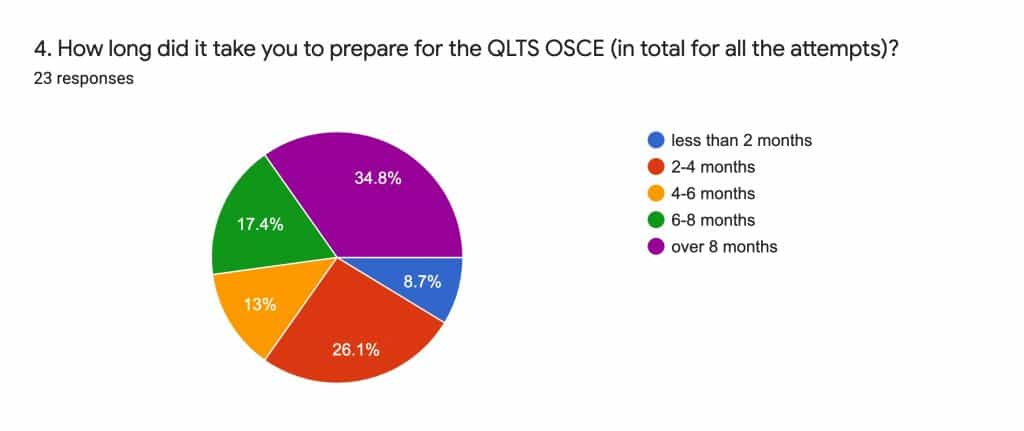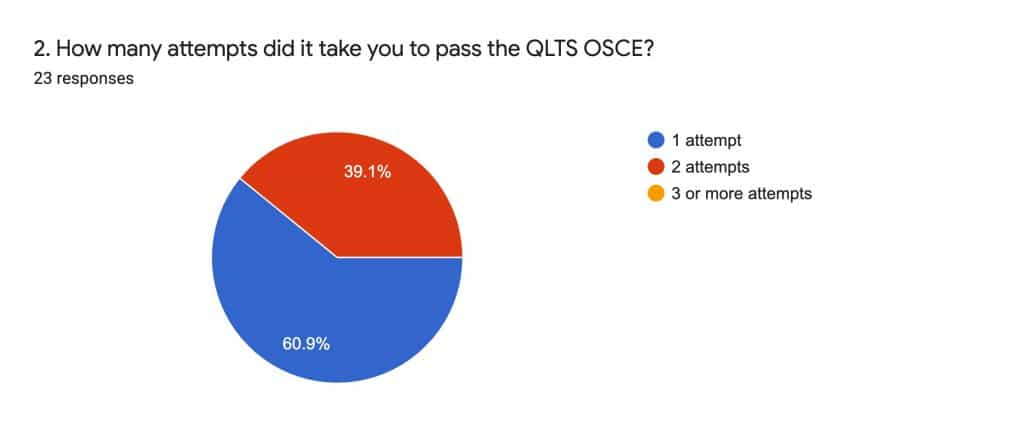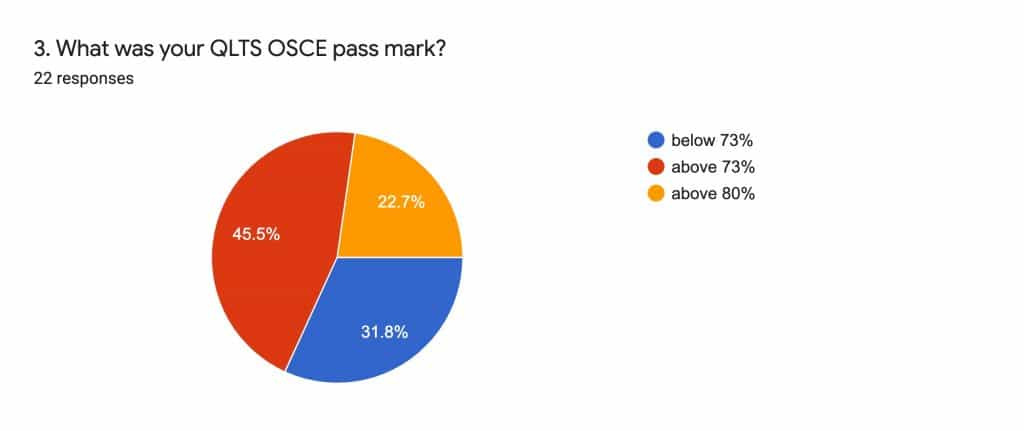How much work should you expect to do?
Qualifying as a solicitor in England and Wales requires thorough preparation and a significant time commitment. Candidates often ask us how much time they need to prepare for the QLTS assessment, and we are starting to see more and more similar enquiries for the SQE. There tends to be a lot of speculation about this issue, so to help clarify matters, we have surveyed our graduates who were successfully admitted to the roll of solicitors by passing the QLTS OSCE between 2017 and 2019. We have outlined the results of this research in this article, and we have also created a guideline timetable (at the bottom of the page) for how many hours should be spent on each subject for common law and civil law qualified applicants. This timeline can also be considered as a rough estimate for the time requirements for preparing for the SQE1 and SQE2 exams, although SQE candidates who do not have a legal qualification may require more time than depicted here.
Whether you’re preparing for SQE1 or SQE2, our specialised resources are here to guide you every step of the way:
SQE1 Course
SQE2 Training
SQE2 Mocks
Retake SQE
Brief summary of the results:
- Civil law qualified candidates usually require slightly more time than common law qualified candidates to prepare for the exam, although not considerably longer. Please see the comparative table below for more details;
- Different areas of law require different prep time;
- Notwithstanding the overall passing rates, the chances of passing QLTS MCT (SQE1 equivalent) in the first attempt are 25.5% higher than QLTS OSCE (SQE2 equivalent).
It is important to note that everyone has unique learning abilities, and there are many other factors which can also have an impact. This should be taken into account when using the guideline timetable provided.
Methodology
Our research consisted of two stages:
(i) The first ‘Quantitative’ stage aimed at collecting more statistical data (prep hours, pass marks, the number of attempts). We surveyed 23 solicitors at this stage.
(ii) The second stage was more ‘Qualitative’ in nature – six common law solicitors were asked to weigh the practice areas against the time they spent on each, and to discuss any similarities of the practice areas with their home jurisdictions.
We have subdivided all the aspiring solicitors sitting the QLTS into three groups. The amount of prep time required varies across these groups, and may also be impacted by other factors. The categories are as follows:
- Legal Practice Course (LPC) graduates: These candidates are currently exempt from the QLTS MCT, but they are unlikely to be exempt from its equivalent SQE1. Therefore, LPC graduates were not a subject of our research for the MCT/SQE1 stage;
- Common Law Qualified graduates: Candidates from countries including Australia, Canada, Hong Kong, India, New Zealand, Pakistan, Singapore, South Africa, UK and USA were invited to participate in the research; and
- Civil Law Qualified graduates: Candidates from countries including Argentina, Brazil, China, France, Germany, Poland, Italy, Spain, Russia and Turkey were invited to participate in the research.
LPC graduates
This category of applicants constitutes a minority among aspiring solicitors seeking qualification via the QLTS bar exam and therefore was not the main focus of our research. However, for SQE purposes we plan to conduct additional research for LPC grads. In general terms, when deciding on the preparation timeline as an LPC grad, you should take the following factors into account:
A. When you finished the course;
B. What grades you obtained; and
C. Which university provided the course (open book exams or closed book exams).
In our opinion, with a balanced correlation of these factors, LPC candidates should spend at least 15 hours a week over an average of 3 months to prepare for the QLTS. More information on LPC candidates and QLTS is available at How does the SQE impact LPC grads?
Before we proceed with a more specific analysis of the two remaining categories, we must remind you that the QLTS exam comprises two separate assessments – the MCT (multiple-choice test of functioning legal knowledge) and the OSCE (mock simulations of practical legal skills assessments).
QLTS MCT (SQE1 equivalent)
The QLTS MCT tests your knowledge and understanding of substantive law. You must first pass the MCT before you can sit the OSCE, as the law covered at the MCT stage is also relevant for the OSCE.
In the case of SQE1, aspiring solicitors will be tested on Functioning Legal Knowledge (FLK) and ethical questions, covering a combination of substantive law (MCT) and practice areas (OSCE):
- FLK 1: Business Law and Practice, Dispute Resolution, Contract, Tort, Legal System of England and Wales, Constitutional and Administrative Law and EU Law; and Legal Services; and
- FLK 2: Property Practice, Wills and Administration of Estates, Solicitors Accounts, Land Law, Trusts, Criminal Law and Practice.
So, SQE1 covers a much broader list of subjects than MCT and will therefore require at least twice as much time to prepare. It may be estimated as the MCT time period plus the OSCE.
(i) Fast-track prep
According to our research, preparation for the MCT is relatively quick: 26.1% of the candidates managed to prepare in less than 2 months. For the rest, it took from 2 to more than 6 months to prepare and clear the MCT. It is notable that among those 26.1% who prepared in a 2 month timeline (spending an average of 23 hours/week), 34.6% passed with distinction. Furthermore, the research results do not reveal any substantial difference between civil and common law qualified candidates. It is worth noting that most of the aspiring solicitors who fall within this 34.6% went on to spend over 8 months to prepare for the QLTS OSCE (SQE2 equivalent), which is above the average time. Most of these candidates also managed to clear the OSCE on their first attempt, however with different marks compared to their MCT results. It may be the case, then, that fast-track preparation for MCT/SQE1 may result in more time required to prepare for OSCE/SQE2.

(ii) Slow prep
Among those who spent over 6 months preparing for the MCT, the vast majority were civil law qualified and on average they devoted 19 hours/week. Interestingly, notwithstanding the fact that it took them more time to prepare, the majority of this group only marginally passed the MCT. When we checked their survey responses for the QLTS OSCE, all of them cleared it in their first attempt, and the majority with distinction. Furthermore, they spent less time on average to prepare for the OSCE compared to those who managed to prepare for the MCT in 2 months.
(iii) Prep strategies
So, those who spent considerably more time preparing for the MCT managed to prepare for the OSCE in a shorter time and passed with higher marks. Why is this? The survey responses were anonymous, but we personally know the candidates who received a high score at the OSCE stage in their first attempt, and they generally found it difficult to pass the MCT. From our discussions with them during their OSCE prep, we came to realise that while preparing for the MCT, this group of aspiring solicitors was focusing primarily on knowledge, rather than practicing the multiple choice tests. Indeed, it took some of them up to a year to prepare for the MCT exam, and some of them only managed to clear it on their second attempt. We have also come across candidates who cleared the MCT in 2 months, and some of them still struggle to pass the OSCE after numerous attempts (3, 4 and even 7).
Based on these findings and observations, we can further differentiate between two extreme categories of candidates regarding their QLTS MCT prep strategy:
- The first category mainly focused on reading textbooks and manuals. While this approach does result in an overall improved level of knowledge, such candidates may not be sufficiently prepared for the multiple-choice test itself.
- The second category mainly focused on practicing a large number of sample multiple-choice test questions. This method may help to clear the MCT stage, but may not offer any advantage for the OSCE stage, where substantive law is just as important, as the above results demonstrate.
Therefore, we conclude that the most effective preparation strategy should involve more of a balanced approach, combining both elements in the form of a middle way. When preparing for the QLTS MCT/SQE1, candidates should undergo substantive preparation via textbooks,manuals, and other materials, while also practicing the multiple-choice tests. The retained knowledge as an outcome of this approach will also be beneficial in the future, when sitting the OSCE/SQE2.
QLTS OSCE (SQE2 equivalent)
The QLTS OSCE assessment objectively requires more preparation time than the QLTS MCT. This exam covers both substantive law (assessed at MCT, LLB, and GDL stages), and 5 practice areas (assessed at LPC) and skills. The overall mark is an average of non-legal elements or skills (50%) and legal elements or law marks (50%).
SQE1 and SQE2 require the same level of legal knowledge, but unlike QLTS MCT and OSCE, SQE2 assesses the knowledge via its application to a factual scenario without offering any answers like MCQs. It also covers practical skills, which are sometimes assessed in challenging circumstances, such as bad or even naughty clients, multitasking under time pressure, specific clients’ goals and hidden conduct issues. Therefore, one cannot simply jump into SQE2 after passing SQE1. In the case of QLTS, MCT (as opposed to SQE1) covers only some elements of the legal concepts tested at OSCE stage.
In our survey, we asked the solicitors to suggest preparation timing for both MCT and OSCE. This was an open question and solicitors suggested the timing which they viewed as appropriate. We calculated the average: 4.9 months prep for MCT and 6.6 months for OSCE, while working full time. As SQE1 and SQE2 covers the same knowledge (as opposed to QLTS MCT and OSCE), we may conclude that the suggested preparation time for SQE1 should take a bit longer, maybe 8-9 months and the prep for SQE2 may then be a bit shorter, maybe 3-4 months, while working full time. This is under the assumption that the SQE candidates will be of the same skill level as QLTS candidates, who are already qualified in their home jurisdictions with the required working experience. Someone who either has no law background or practical legal experience would certainly need to spend considerably more time to prepare.
Of course, the prep time for the QLTS OSCE or SQE2 depends on a number of individual factors, including previous experience, obtained qualifications, cognitive skills and functions, memory, time availability, anxiety issues and many others. Additionally, if the candidate did not prepare well enough for the MCT/SQE1, preparation for the OSCE/SQE2 may take more time, as our research shows.
Let’s compare the following 3 data charts:



To summarise these results:
- 52.2% of the respondents eventually required more than 6 months to prepare for the QLTS OSCE (SQE2 equivalent);
- 39.1% had to resit the QLTS OSCE (SQE2 equivalent); and
- 31.8% were at risk of failure.1
We have included 2 tables below, for you to be able to compare the combinations of the respondents’ individual answers. In order to facilitate the comparison, we divided all the candidates into two groups: G-1 (those who prepared in more than 6 months) and G-2 (those who prepared in less than 6 months). You can see that:
- Those who did not clear the exam in their first attempt, except for 1 LPC graduate, prepared for the MCT in too short a time, which prejudiced their performance at QLTS OSCE; and
- Those who managed to prepare in less than 2 months are common law qualified, and they also spent 30-35 hours/week to prepare for the exam, which is above the average.

How the Academy of Smart Lawyers Can Help You with the SQE
At the Academy of Smart Lawyers, we believe in providing an exceptional educational experience that goes beyond the conventional methods. Here’s how we achieve this:
– Quality Over Quantity: We prioritise mistake-driven learning and active tutoring through SQE2 one-to-one sessions, including comprehensive SQE1 prep and SQE2 preparation.
– Respect and Diversity: Our global community of diverse legal professionals is united to transform the future of legal education. As a student, you join us not just as a learner but as a colleague and a member of the Smart community. Our programmes, including the SQE 1 course and SQE 2 course, Higher Rights of Audience and other professional training. It caters to a wide range of students, including foreign lawyers seeking to qualify in the UK.
– Smart Technology: We champion online education, digitalisation, and EduTech with our cost-effective and flexible SQE training platform. This platform is tailored for individualised learning, offering a variety of resources such as SQE1 materials, SQE2 mock exams (SQE2 mock simulations), and SQE Multiple Choice Questions (MCQs). Whether you’re engaging in SQE self-study or attending our SQE lectures, you’ll find all the tools you need.
Thanks for sharing.